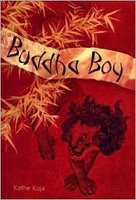
I suspect that Buddha Boy by Kathe Koja is supposed to be the story of its narrator, Justin's, response to the bullying a Buddhist outsider at his school endures and Justin's desire to do the right thing by the victim even though it's difficult. It reminded me of a more recent book, Firegirl by Tony Abbott, which is the story of its narrator, Tom's, response to a disfigured new classmate. But in Buddha Boy, Jinsen, the Buddha Boy, doesn't remain a mysterious figure the way the firegirl does, allowing Justin to become the center of struggle and suffering. He competes with Justin for the lead in this book.
Part of the reason for this, I think, is that Buddha Boy suffers from a lot of telling. Jinsen gets the living daylights beat out of him, and we find out about it later. We learn about Jinsen's very interesting backstory (which came as a welcome surprise) as Justin's recollection after Jinsen tells it to him, making it, I think, almost third hand. Certainly far removed from the actual event. We're told what the school administrators do about the bullies, but we don't see them dealing with kids.
Earlier this spring someone at one of my listservs said she thought people make too much of the instructions to writers that they should show, not tell. But telling really does undermine dramatic moments. It really does distance readers from what's going on. In the case of Buddha Boy, we lose what should have been a lot of tension and maybe even suspense. Because we never see Justin at the scene of action, he doesn't become a mover and shaker in the story. At the same time, we hear about all these things happening to Jinsen, but we never see that, either.
So we end up with a story without a dominant character.
Check out other responses to Buddha Boy.
2 comments:
A lot of people were a lot more enthusiastic about this book than I was.
That was definitely the feeling I was getting when I checked out reviews after I read it.
I think a lot of readers read for content. This was a bully book, it brought Buddhism to the table, and I think a lot of adult readers appreciate content that deals with kid problems or covers something new for them. I'm almost always interested in "how did they do it?"--the writing aspect--and that's a different type of reading.
I did like the odd voice in Buddha Boy, which one reviewer described as sort of stream of consciousness.
Post a Comment